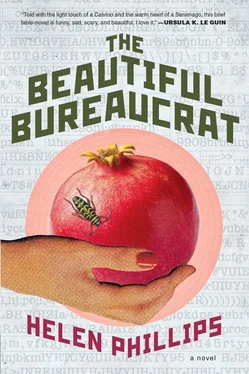“The work suits you, does it not?” The Person with Bad Breath said.
Emboldened by this note of kindness, by the slight vulnerability evident in the fact that her boss’s shirt collar had flipped up in the back and was not lying impeccably beneath the gray jacket, Josephine found herself confessing: “I wonder about them.”
“About whom?” The Person with Bad Breath inquired, as though it wasn’t obvious. “Oh, them .” Now moving toward the door, reaching for the knob, almost gone. “It is better never to wonder about them.”
The orderly quiet of Josephine’s office had alchemized into dense silence. She spent the rest of the workday blasting through files, devoid of curiosity, dying to get the hell home and just be a person with Joseph.

When she returned from work, he wasn’t at the stranger’s apartment. She pulled a postal notice off the door and stepped inside just as she heard the three-headed dog heave itself against the door at the end of the hall. Her hands felt weak and her eyes hazy. She added the postal notice to the stranger’s feral pile of mail on the bedside table. She sat down on the futon. She called Joseph’s phone. It went straight to voice mail. She didn’t leave a message.
She opened the mini-fridge. There was half an onion and some expired sour cream. She was hungry and not hungry.
She decided to do good things. She lit the candles. She gathered up all the dirty laundry, sheets included, and tried to remember if the stranger had said anything about the location of the building’s laundry room. But then she realized she had no quarters or detergent, and the thought of remedying those problems felt insurmountable. Anyway, they’d made it this far without doing laundry.
She found couscous and chickpeas in the cupboard. She found curry powder. She cut up the onion, turned on the burner, made something, ladled the concoction onto two of the stranger’s green heirloom plates, spread the blanket on the floor, put a pair of candles in the middle, folded paper towels into napkins. She was pleased at her resourcefulness, notwithstanding her failure in regard to the laundry. She knew he would come in the door any second; every move she made, she imagined him walking in on that particular tableau, of her slicing or stirring or serving or folding, and she anticipated the exact expression he’d make, the thing with the eyebrows, the faux surprise, pretending he’d forgotten that she too could cook.
The food was cooling on the floor. She called his phone again; voice mail again. She turned on the radio balanced on the ledge in the stranger’s shower stall and pretended the newsman’s voice was Joseph talking to her from the other room, making measured and tranquilizing predictions about the future and the stock market. She waited, then devoured her food. She called him a third time and left a peevish voice mail. She texted him a single question mark.
Time passed; more than an hour. She called him again, told his voice mail that she was kind of freaking out. She vacillated between worry and rage. She couldn’t stand to spend another second inside this apartment without him. There was a rotten smell emerging from the closet. For the first time it occurred to her to wonder if he’d left any sort of note. She shuffled through the stranger’s unruly mail. The postal notice that had been on the door earlier slipped to the floor. She picked it up. She was about to stick it deep into the middle of the pile when the familiar letters caught her eye.
In the intended-recipient box: JOSEPHINE NEWBURY.
But they hadn’t told anyone the address of the sublet.
She examined the notice. FIRST DELIVERY ATTEMPT FAILED: Package could not be delivered/signature needed . There was no information about the sender. Her fingers were quivering. She blew out the candles. She turned on the overhead light. A train ached past the window.
She now detested the automated lady who repeatedly offered her the option of leaving a voice message for Joseph Jones. Who, after many messages left, informed her that Joseph Jones’s voice mailbox was full. She saw that her text had never been delivered. She considered calling the police. She imagined them laughing at her. A husband a few hours late getting home. Sorry, baby, you’re not the first. The overhead light stared her down. She turned it off and sat awake on the bed for many hours.

At her desk on Friday, logging files into the Database, Josephine began to believe she was the only person in the entire building. It was so silent in 9997—no noise but the sound of her fingers on the keyboard, her fingers opening the files — that she sensed a scream beneath the silence, a shrill shriek she recognized as the flow of her own blood in her ears, yet it sounded like a banshee trapped in the walls. Those pinkish clawed walls — she generally avoided looking at them, but today she got stuck staring at the mysterious smudges and old fingerprints, as though the walls themselves might reveal his whereabouts.
Tonight she would call the police, and the parents, who had warned them what would happen if they left the hinterland. Her mother had stood in the beige kitchen of their hinterland rental, talking about the thing she’d seen on the news: Nowadays, gangs of teens in the big cities would just come up to strangers at random on the street and punch them. Just punch them in the face! As part of some gang initiation or something. And that was just the kind of horrid thing that happened in some places and not others. And what if, say, Josephine were to be pregnant at some point, and a gang of teens just punched her on the street? What then? Her mother knew exactly how to kill her every time. Her conversations with her mother were a list of things she thought but didn’t say. Why would you move to a place where you don’t know a living soul? (Haven’t you noticed that our life here is not progressing, Mom? That we’re stuck? That we’re getting flattened by the freeways?) You’ll be all alone there! (What about Joseph, Mom?) Friendless! (I’ll be with Joseph, Mom. Love of my life, Mom.) But by then her mother was crying — melodramatic tears, yet still tears.
Friendless! Friendless! It lingered like a curse.
The door shot open. Josephine seized up, expecting The Person with Bad Breath, but it was Trishiffany who paraded in. She stood before Josephine’s desk in a suit the color of a stop sign, hugging a single gray file to her breasts, her hair voluminous.
“Hi there, Jojo doll.”
Josephine’s gratitude at seeing another human being — wearing vivacious red, no less — was somewhat undercut by the inappropriate use of the nickname; her mother always insisted that everyone call her Josephine, and so they had. She opened the file at the top of the extra large crop on her desk (BRAAK/MARCUS/TODD) and tried to look busy.
“This is for you,” Trishiffany announced, shoving her gray file atop BRAAK’s.
OLGUIN/VIOLA/PINK. A unique enough name that Josephine remembered it, vaguely, from sometime last week.
“I already entered that one,” Josephine said.
“Of course you did, Jojo doll,” Trishiffany cooed, leaning over the desk almost seductively, revealing her cleavage. Josephine winced at the sight of the red capillaries in the whites of Trishiffany’s eyes; her own eyes throbbed in solidarity. “But now you have to delete it.”
“Delete it?” She turned her gaze away from Trishiffany’s excessive chest and strained eyes. She was having trouble telling whether her coworker’s tone was friendly or menacing.
Читать дальше





![Unknown - [Carly Phillips] The Bachelor (The Chandler Brothe(Bookos.org) (1)](/books/174132/unknown-carly-phillips-the-bachelor-the-chandle-thumb.webp)








